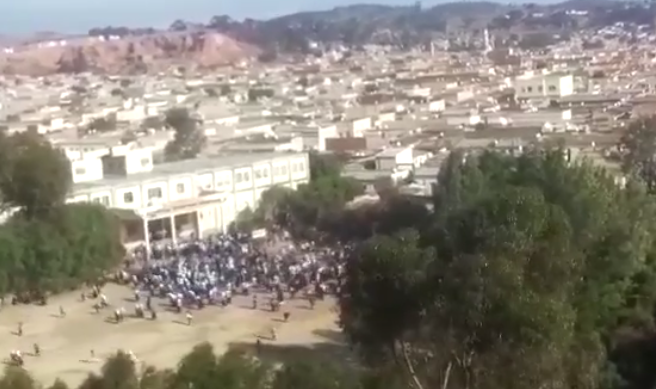The underground resistance movement in Eritrea has spoken by telephone to Dutch journalist Wim Brummelman about the protests at the Akria school in Asmara.
Speaking by phone from Asmara, members of the Freedom Friday (Arbi Harnet) movement called for an international inquiry into the events that took place a week ago.
The protests that were sparked by the arrest of a 92 year old community elder who was chair of an Asmara School that the government was attempting to bring under its control. This resulted in a volley of shots and was followed by a widespread roundup, including the arrest of underage children and women.
The spokesperson for Arbi Harnet in Asmara confirmed that, despite reports to the contrary, so far they haven’t come across any fatalities. He contended that this was because the soldiers sent to put down the protests refused to shoot directly at the protesters: “They did not shoot the people. That, they refused,” said the Abri Harnet spokesperson.
In addition the member of the underground, a Christian himself, explained that despite the fact that the protests started at an Islamic school the march was soon joined by Christians. “Muslims and Christians are united,” he said. “They want the government to stop interfering with their education. That’s why the people took to the streets”.
And he added that the matter is not just a question of religious freedom: it is about all aspects of human rights in Eritrea. “This regime puts [restrictions] in place, on all possible freedoms of its citizens. That’s why so many people flee Eritrea. That has to stop. Therefore, we pray that this government disappears. ”
Finally the spokesperson for the Asmara underground said that although calm appears to have returned to the city, resistance will continue. “Of course I’m afraid. So many people are afraid. We run great risks. But there will be new protests. Perhaps at a small scale in the beginning, in different places. And maybe that sounds like something big. That’s why it’s so important that the world knows what’s going on here. ”
Contact:
Note: Arbi Harnet was established on 11/11/11, as a diaspora based movement with the aim of linking the diaspora struggle for justice in Eritrea to the movement inside the country.




























